Khaled al-Jeratli | Yamen Moghrabi | Hussam al-Mahmoud
In recent days, statements from Turkish President Recep Tayyip Erdoğan have dispelled any doubts about the Turkish-Syrian normalization process stalling. Ankara is moving towards normalization at a pace that has made a potential meeting between Erdoğan and Bashar al-Assad a matter of time, arrangements, and understandings with Moscow.
Given the timeframe accompanying the ongoing political movement in this regard, there has been a complete shift in Turkey’s stance on the Syrian issue. This has been reflected in the official treatment of key aspects of the entire matter.
Enab Baladi discusses with a group of researchers and political analysts the features of these Turkish shifts, the stance of the Syrian opposition on these changes, and the likelihood of their continuation.
Enab Baladi also addresses the future of the rapprochement path and the expected extent it might reach, particularly after a previous Russian acknowledgment of the collapse of the course, which Moscow officially initiated in December 2022 with a meeting of the defense ministers of Turkey, the regime, and Russia. This collapsed in the fall of 2023 due to political and regional factors, including the Israeli war on Gaza and political conditions on both sides delaying attempts to revive it.
Possible invitation to al-Assad
On July 5th, Erdoğan expressed his intention to invite al-Assad to visit Turkey with Russian President Vladimir Putin, considering it as the beginning of a new process.
Erdoğan stated, “We have always extended a hand of friendship to our neighbor Syria, embracing it on the basis of a new fair and comprehensive social contract,” adding that it is necessary for Syria, whose infrastructure has been destroyed and whose people have been dispersed, to stand on its feet again and end the instability.
He added, “We will stand by a prosperous and unified Syria […] as long as Syria reciprocates this big embrace and recovers in every field.” Erdoğan mentioned that the parties opposing Turkish-Syrian relations mainly include organizations such as the Kurdistan Workers’ Party (PKK), the Democratic Union Party (PYD), the People’s Protection Units (YPG), and the Islamic State, according to Turkish media.
These statements and the potential invitation preceded a meeting on July 3rd between Erdoğan and Putin on the sidelines of the 24th summit of the Shanghai Cooperation Organization (SCO) leaders in Astana, Kazakhstan.
The Russian-Turkish meeting touched on the Syrian issue and the matter of seeking a solution to the tension in Syria and “combating terrorism.” Erdoğan emphasized the importance of ending the instability that creates fertile ground for “terrorist organizations,” including the “civil war,” expressing Turkey’s readiness to cooperate to reach a solution.
On the same day, the Turkish Foreign Ministry released a statement linking the talks it plans to conduct with the Syrian regime to its national security requirements, stating that Ankara has taken a principled stance since the beginning of the “crisis” in Syria. While revising its foreign policy to align with its national interests, Turkey did not hesitate to take necessary measures to address threats to its national security.
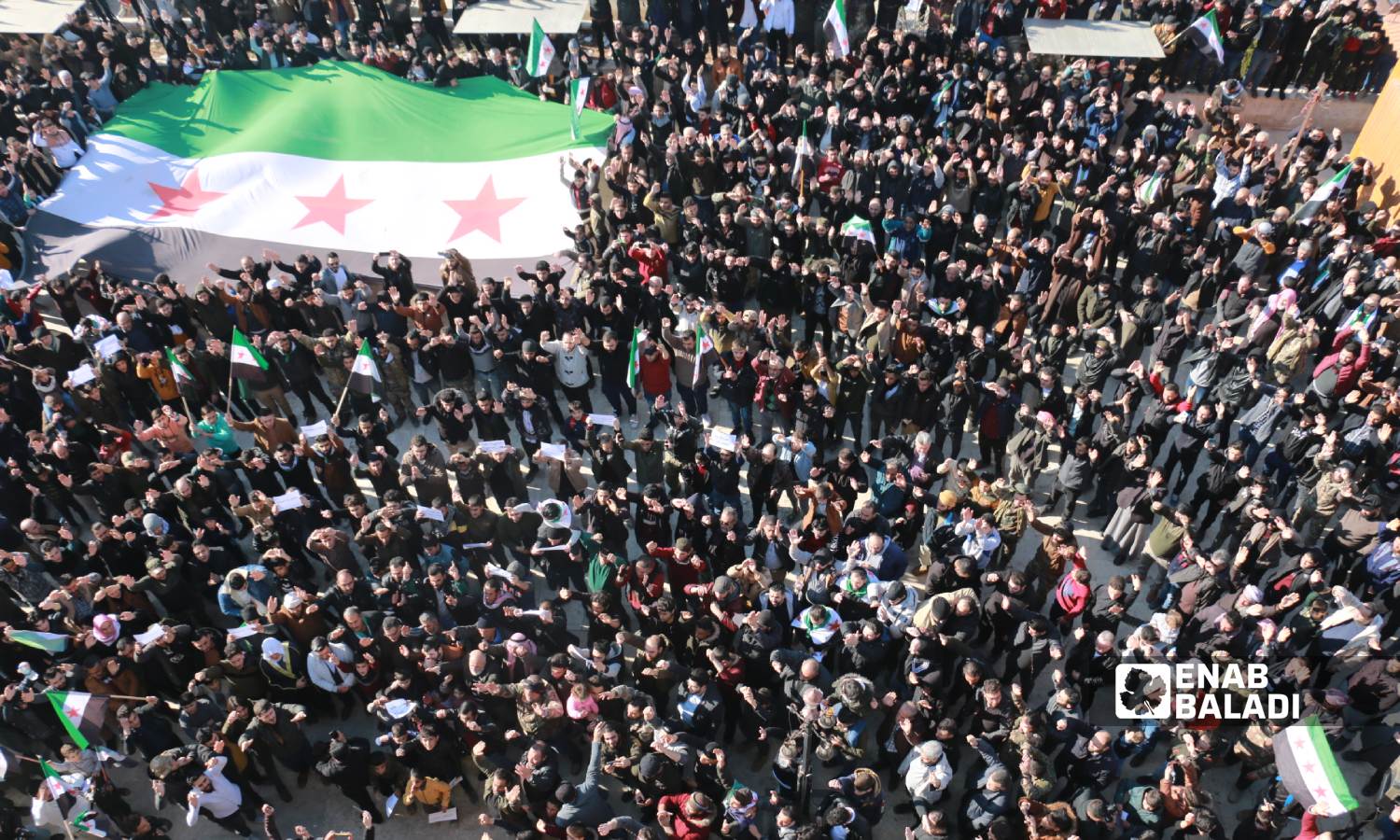
Protesters in the northern countryside of Aleppo city of Azaz, denouncing Turkish statements on rapprochement with the Syrian regime and emphasizing the continuation of the Syrian revolution – December 30, 2022 (Enab Baladi/Dayan Junpaz)
The friendly language towards the Syrian regime has raised concerns among its opponents, especially with the rise in violations against Syrian refugees in Turkey, leading to clashes with Turkish forces in northern Syria. This came after Erdoğan sent clear political messages to both the regime and the Syrian opposition on July 2nd. He spoke about the benefits of opening tight fists in politics, stating, “We will not refrain from meeting anyone, as was the case in the past,” referring to the relationship with Damascus.
However, Erdoğan reaffirmed not compromising Ankara’s relationship with the Syrian opposition, stating, “We will not allow anyone who trusts us, seeks refuge with us, or works with us to be a victim in this process. Turkey is not and will never be a country that abandons its friends.”
The Turkish “softened” rhetoric towards the regime was preceded by al-Assad showing openness on June 26th to all initiatives related to the relationship between Damascus and Ankara, based on what he described as Syria’s sovereignty over its territories and fighting all forms of terrorism and its organizations.
This “openness” came during al-Assad’s meeting with the Russian President’s special envoy, Alexander Lavrentiev, in Damascus on June 26th, where he considered those initiatives reflecting the will of the concerned states to bring stability to Syria and the region.
The Syrian side reciprocated with statements revolving around Syria’s sovereignty, security, prosperity, and future, denying any Turkish ambitions in Syria, with the talk of normalization conditions declining, which had dominated the scene until early June. The Turkish Defense Minister, Yaşar Güler, expressed readiness to withdraw militarily from Syria within specific and not new frameworks and conditions for Ankara.
Güler added, “We are prepared to support the establishment of a comprehensive constitution, conduct free elections, and provide a normalization and secure environment. After achieving these, and ensuring our border security completely, we might consider withdrawal if necessary,” as reported by Turkish media.
The presence of the Syrian file and the relationship with Damascus was not limited to Erdoğan’s statements. Turkish Foreign Minister Hakan Fidan said on June 24, “We see the return of refugees as important, and we believe that if Syria’s government and opposition were to unite, it would become a significant player in the war against the terrorism of the (Kurdistan Workers’ Party).”
Repercussions on eastern and western Syria
The Turkish-Syrian rapprochement path is highly sensitive within Syrian geography, mainly concerning the fate of opposition-controlled areas supported by Ankara in northwestern Syria. They are now preoccupied with the issue of opening communication lines between these regions and regime-controlled areas, driven by Russian-Turkish influence. Additionally, areas controlled by the Syrian Democratic Forces (SDF), supported by Washington in northeastern Syria, are under pressure, as both sides consider these forces “separatist” and “terrorist.”
On June 24th, the Turkish Foreign Minister, Hakan Fidan, highlighted the achievement thus far: “The war between the Syrian regime and the opposition is not active.”
He added, “The return of refugees is crucial, and we believe that integrating Syria’s government with its opposition would make it a key player in the fight against PKK terrorism.”
North-western stick
On June 26, the local council announced the opening of the Abu al-Zandeen crossing in eastern Aleppo countryside, through a Russian-Turkish agreement to consider Syrian-Turkish economic interests, then humanitarian considerations when it is opened for the movement of individuals, according to the pro-regime newspaper, Al-Watan, which expected, citing its sources, more “thawing” in Turkish-Syrian relations, under the patronage of Russia, which insists on moving the two sides to a new horizon in economic relations, and perhaps political ones later, according to the sources.
However, the residents of the area did not perceive the decision to open the crossing as a positive event and considered it a normalization with the regime, which they had refused over the past years, leading them to protest in the streets against the decision.
A few days after the announcement of the crossing’s opening and the residents’ protest, and the optimism of regime-aligned media, protests returned to northern Syria, but they were more violent than those that preceded them in recent years, especially as the opening of the crossing coincided with racist attacks against Syrian refugees in Turkey, most notably in the province of Kayseri, where protesters attacked everything symbolizing Turkey in the area, from flags to service and military institutions.
In the city of Azaz near the Bab al-Salama crossing, protesters attacked cars owned by Turkish traders and citizens working in northern Syria, smashing them in response to the assaults against Syrians in Turkey.
The wave of protests in Syria ended after part of it turned into armed confrontations in the city of Afrin, resulting in the death of five Syrians by Turkish soldiers’ gunfire in the area.
The protests ceased, but the assaults on Syrians in Turkey did not stop, as Turkish racists attacked Syrian shops and homes again one day after the protests ended.
Former Syrian opposition politician and president of the Syrian National Coalition, Khaled Khoja, told Enab Baladi that the year 2016 was pivotal in the nature of the opposition’s relationship with Turkey, considering that the changes Ankara made in its decision-making hub at the time changed the Turkish perspective towards Syria.
He added that the Turkish perspective shifted from supporting the Syrian opposition and political change in its neighbor to fighting the establishment of a Kurdish entity on its southern border, fearing it might become a model to be emulated within Turkey.
Despite the changes Khoja pointed to, he considered that Turkish policy, no matter how altered, cannot bear losses for the benefit of Russia or Iran in Syria, but it has engaged in several political tracks with Russia as political shifts in the region aimed to reach a solution in Syria.
Khoja believes that the opposition bodies collectively, whether political, civilian, or military, are incapable of achieving any gains, as they have become dependent on political tracks sponsored by Turkey with Russia, considering Ankara responsible for containing the movements of this opposition.
What can truly affect Turkey’s policy towards Syria is northern Syria, which includes the true Syrian opposition, knowing that northwestern Syria regions have no presence in the regional political equation and are given no weight by the political track parties, but the residents of these areas have the capability to place obstacles in the wheels of normalization.
Khaled Khoja, former president of the Syrian National Coalition
Researcher at the Harmoon Center for Contemporary Studies, Samir al-Abdullah, sees that the problem lies within the opposition itself, not Turkey, especially with the factional state in northern Syria and the bad condition of the official opposition institutions.
He added that the opposition distanced most of the “national and revolutionary” figures from its ranks, thus making concessions in exchange for preserving the personal interests of some of its leaders, noting that without genuine reform of these institutions, they will keep making concessions.
Al-Abdullah sees that at the popular opposition level, the latest demonstrations in northwestern Syria conveyed a message to Turkey that the region’s residents will not accept any agreements Turkey makes that do not meet the Syrian people’s aspirations.
The researcher told Enab Baladi that the whole matter boils down to interests, focusing on Turkey’s attempts to maintain its security, noting that Ankara’s interests may overlap with those of the Syrians in some aspects, making the likelihood of Turkey abandoning the opposition unlikely in the current situation.
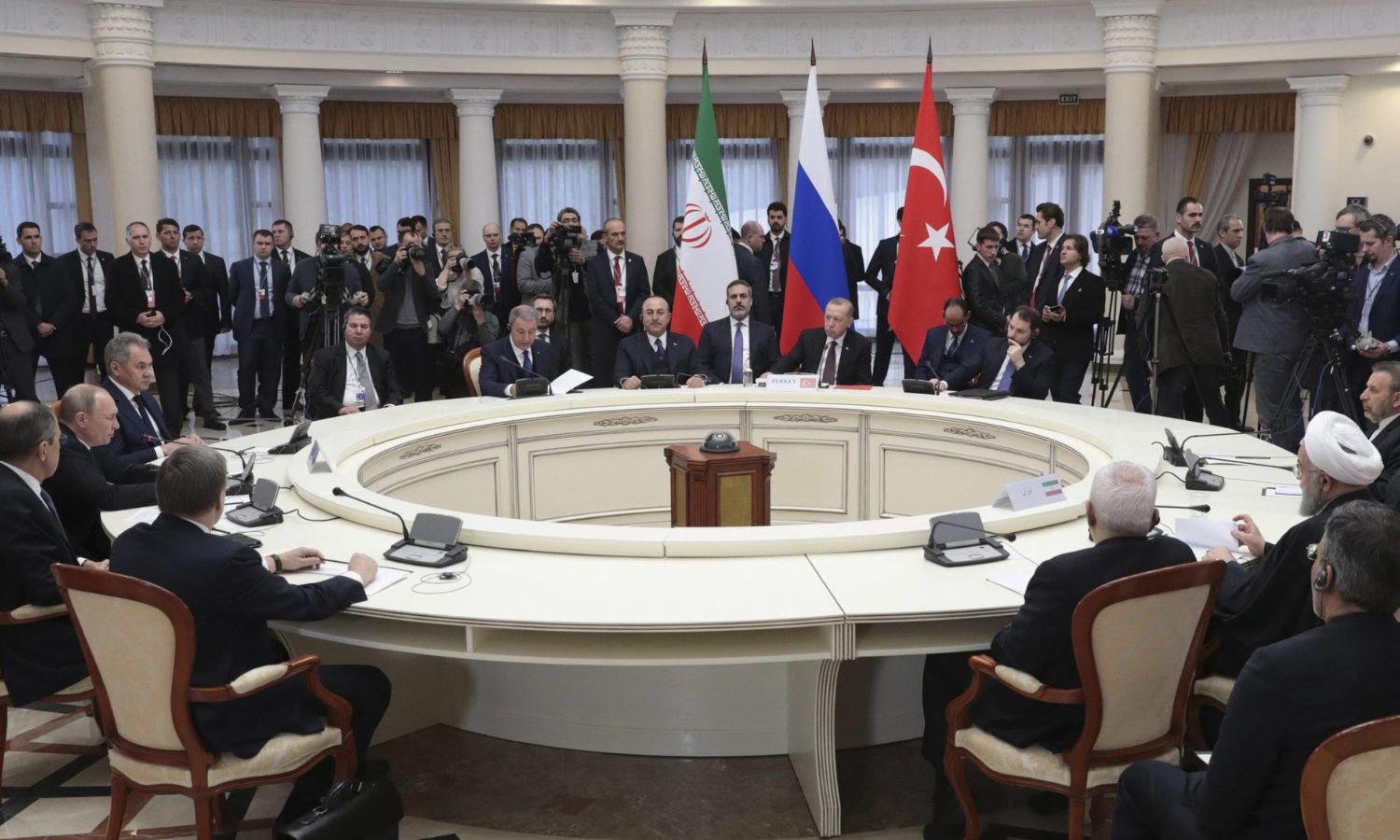
Turkish President Recep Tayyip Erdoğan, Russian President Vladimir Putin, and former Iranian President Hassan Rouhani during a meeting in Sochi, Russia – November 22, 2023 (Kayhan Ozer/Pool via AP)
North-east targeted
The Autonomous Administration of North and East Syria (AANES) rejects any rapprochement between Turkey and the Syrian regime, considering it targets its project and accomplishments achieved in Syria with American support over the past years.
After Turkish President Recep Tayyip Erdoğan expressed his intention to meet with the Syrian regime head and revive the reconciliation process, AANES attacked the move, saying through a statement that it is “against the interests of Syrians generally and consolidates division and a conspiracy against Syria’s unity and people.”
AANES stated, through an official statement, that the agreement with Turkey “will not achieve any positive results but will worsen the Syrian reality and spread more chaos, and will be support for all those supported by Turkey, primarily the Islamic State,” according to its statement.
AANES did not suffice with a statement condemning the move but expressed its readiness to engage in discussions with the Syrian regime and “liberate the occupied areas alongside the Syrian army.”
Deputy co-chairman of the Executive Council in the Autonomous Administration, Hassan Kojar, said on July 3 that Turkey wants to exploit all parties in Syria to achieve its agendas, so the Damascus government should not be deceived by these tricks.
He added, “We pose no threat to anyone and are not enemies of any party; we aim to build Syria and preserve its territorial integrity. We have always said that we are ready to liberate the occupied Syrian areas in cooperation with the Syrian army.”
Researcher specializing in Kurdish affairs at the Omran Center for Strategic Studies, Samer Ahmed, considers that Hassan Kojar’s speech was similar to the Autonomous Administration’s moves to propose a dialogue path with the Syrian opposition as just a flirting attempt.
Ahmed added that it wouldn’t be useful, as the regime looks for Russian support leading to an improved relationship with Turkey and achieving significant political and economic gains.
According to the researcher, it is impossible for the regime to sacrifice all it stands to gain from rapprochement with Turkey for an agreement with the Kurdish-led Syrian Democratic Forces (SDF).
At the beginning of this year, the Autonomous Administration announced its intention to hold local municipal elections, followed by announcing, in April, a population census, and in May, it invited international governmental and non-governmental organizations to monitor the electoral process.
These steps provoked Ankara, creating a primary motive for Turkish politicians to call for counter-moves, some of which included calls for coordination with the Syrian regime militarily against the Autonomous Administration elections.
Political philosophy professor at the University of Paris, Rami Khalifa, said that the direct reason for Erdoğan’s announced possibility of meeting al-Assad is the Autonomous Administration, as Turkey feels anxious about developments in northeastern Syria, where it is seeking to establish and emerge as an entity, whether as a state or a quasi-state that could be built upon later, which Ankara rejects.
He added that Turkey considers relying on the US administration, whether Trump returns or Biden stays, as unrealistic due to previous experiences between the two sides, while betting on Russia and Iran, as discovered during the Astana process, is more feasible and effective.
Turkey views rapprochement with the regime as primarily aimed at restricting the Kurdish model or the political system established by the People’s Protection Units (YPG) in northeastern Syria. Consequently, in this context, the primary target is the Syrian Jazira region.
Rami Khalifa, professor of political philosophy at the University of Paris
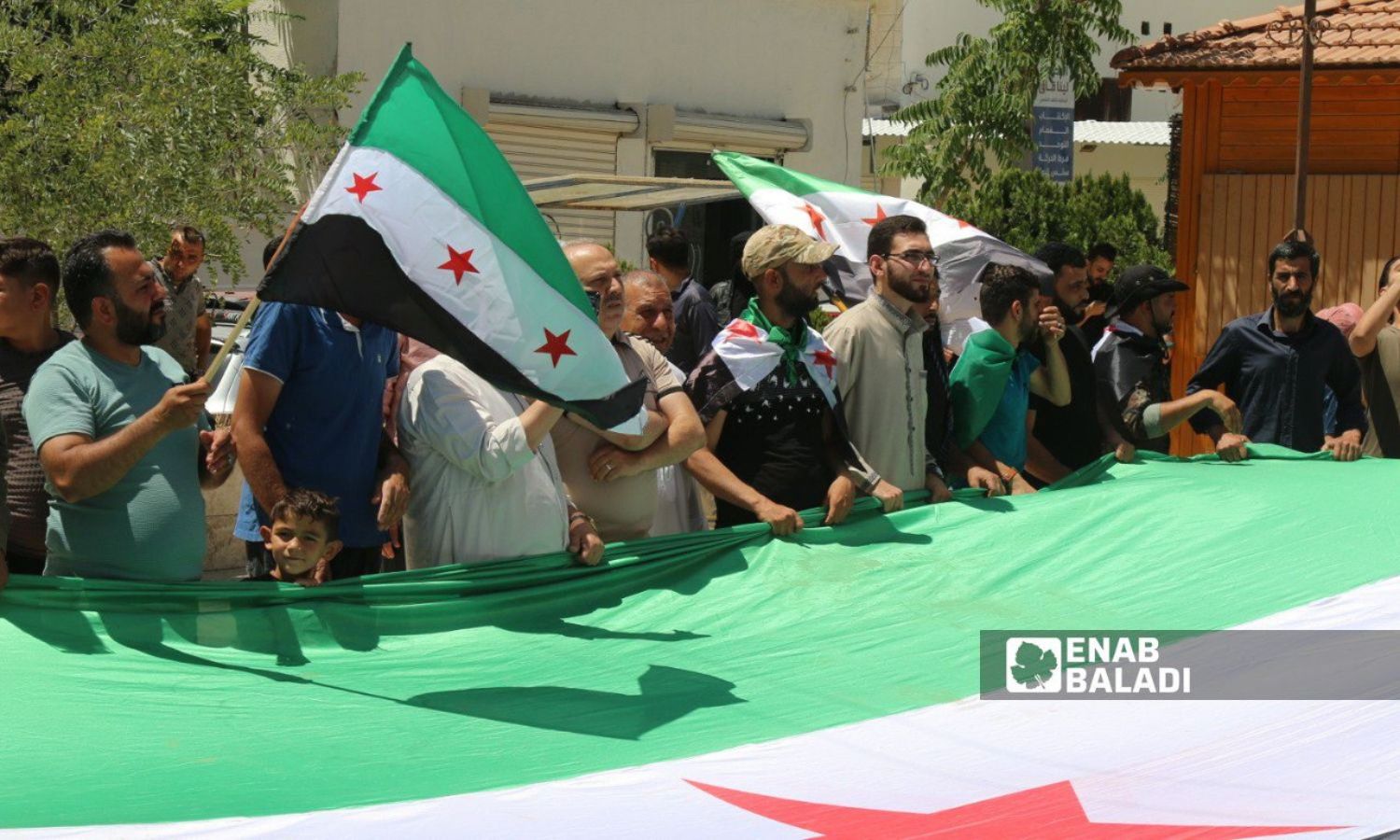
Azaz residents raise revolution flags during a protest rejecting Turkish statements about relationships with the regime and the opening of the Abu al-Zandeen crossing – June 28, 2024 (Enab Baladi/Dayan Junpaz)
Where is the Syrian opposition?
The absence of the Syrian opposition is not a new phenomenon in the political arena. Turkish proposals for rapprochement with the regime have been accompanied by either a lack of comment from the opposition or general interventions without a clear stance. This suggests that the relationship between the opposition and Ankara, which hosts the traditional opposition bodies, most notably the Syrian National Coalition and the Syrian Interim Government, takes the form of a subordinate and superior relationship rather than that of allies, as the opposition institutions prefer to call it.
Even with the Turkish President announcing more clearly and directly the work on developing relations with the Syrian regime, saying, “As we kept our relations with Syria very much alive, we held these meetings with Mr. Assad in the past, including family meetings,” there was no comment from the opposition.
Syrian National Coalition links reconciliation to solutions
Hadi al-Bahra, President of the National Coalition for Syrian Revolutionary and Opposition Forces (Syrian National Coalition), said via “X” that a sustainable solution in Syria does not lie in reaching understandings between states and the regime to protect their interests and security.
He added that the solution lies in convincing Syrians inside Syria, displaced persons, refugees, exiles, and migrants, that they have a state with a constitution that is implemented and respected, laws that guarantee their personal and societal security, ensure their rights, ensure their freedoms, and provide them with opportunities for a free, dignified, safe, and stable life—a state in which they can remain or return to.
Al-Bahra did not directly link his comment to the course of Turkish rapprochement with the Syrian regime, but he may have summarized an unspoken stance held by the Syrian political opposition, especially as no acceptance or rejection announcement has been issued by the ally.
Ahmed Bakoura, a member of the political body of the Syrian National Coalition, said to Enab Baladi that the Coalition always affirms its firm stance and rejection of any form of normalization with the regime.
He added that such normalization would strengthen the regime’s power and increase the suffering of the Syrian people, who have suffered and continue to suffer from the regime’s oppression and crimes.
We consider that the political solution should be through a comprehensive process that ensures the rights and interests of all Syrians, based on UN Security Council Resolution 2254, which stipulates respecting the sacrifices and sufferings of the Syrian people, guaranteeing that criminals do not escape punishment for their crimes, and fulfilling the Syrian people’s aspirations for freedom, justice, and democracy.
Ahmed Bakoura, Member of the political body of the Syrian National Coalition
He also mentioned that in light of the current developments, the Coalition sees any attempt at normalization with the regime as being at the expense of the Syrian people’s rights and aspirations, and would deepen the crises rather than solve them.
Bakoura emphasized that the Coalition considers the importance of preserving Syria’s unity and territorial integrity and working on finding a political solution that provides lasting peace and stability to the entire region, according to international resolution 2254.
He pointed out that the interests and rights of Syrians should remain a top priority for friendly countries, including Turkey, stressing the importance of maintaining international support for the Syrian cause and ensuring that Syrians’ rights are not marginalized in any future arrangements.
Will Turkey abandon the Syrian opposition?
After a wave of protests ignited by several factors, including Turkish statements about rapprochement with the regime, in northern Syria, Turkish President Erdoğan returned with reassurances to the opposition. On July 2, he said there is great benefit in opening tight fists in foreign and domestic policy. “We will not refrain from meeting anyone, as was the case in the past,” referring to the rapprochement path with the Syrian regime, but he stressed that it would not harm his country’s allies, in reference to the Syrian opposition.
“When doing so, we will consider Turkey’s interests first, but we will not allow anyone who trusts us, seeks refuge with us, or works with us to be a victim in this process. Turkey is not and will not be a country that abandons its friends,” said Turkish President Erdoğan.
Member of the political body of the Syrian National Coalition Ahmed Bakoura told Enab Baladi that the Coalition views the forces of the Syrian revolution and opposition as a major partner in fighting “terrorist organizations,” but within a political framework aiming to achieve the full aspirations of the Syrian people.
Bakoura added that any efforts made to fight “terrorism” should be part of a comprehensive strategy to achieve lasting peace and stability in Syria.
Despite the historical and fraternal ties between the Syrian and Turkish peoples, which Bakoura appreciates, he hopes that the demands of the Syrian people will remain at the forefront of Turkish policy priorities, especially in achieving peace and stability and ensuring the voluntary return of refugees to their original places of residence in safety and dignity.
Samir al-Abdullah, a researcher at the Harmoon Center for Contemporary Studies, believes that Turkey will not easily abandon the Syrian opposition and its demands. He considers the opposition’s presence to give Turkey a stronger position in negotiations with the regime and its allies, or with the United States.
Al-Abdullah told Enab Baladi that the opposition’s demands align with Turkish national security interests, whether concerning “fighting the terrorism of the PYD” or the issue of refugee return, achieving stability in Syria, and maintaining its unity.
Regarding previous experiences, Turkey approached Egypt, but this rapprochement was not at the expense of the Egyptian opposition. Turkey’s interests require cooperation and support for the Syrian opposition, and there may be some concessions during negotiations between the parties, but Ankara will gain something in return from the regime and its allies that will benefit the Syrian opposition itself.
Samir al-Abdullah, Researcher at the Harmoon Center for Contemporary Studies
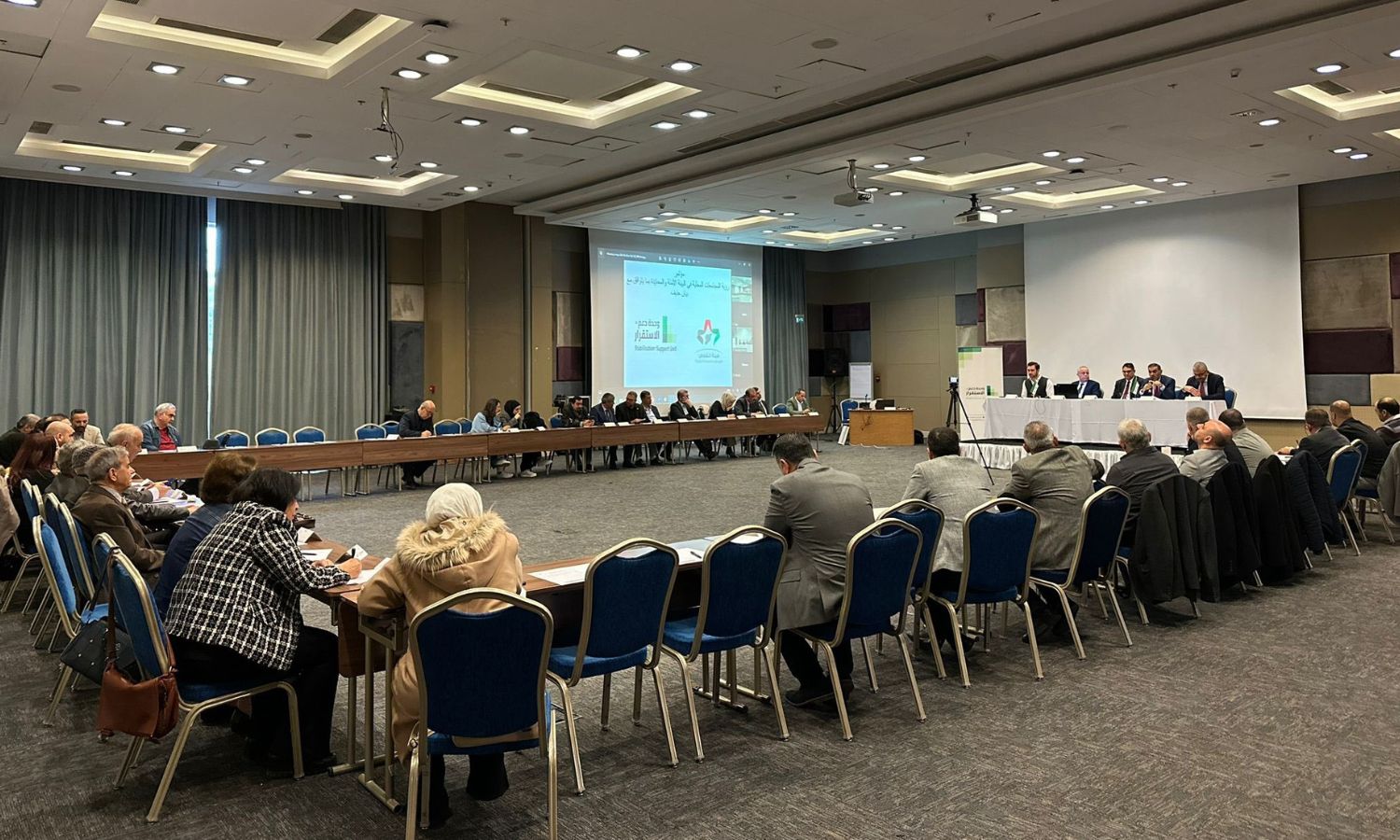
Representatives of the Syrian opposition during the workshop held by the Stabilization Support Unit in the Turkish city of Gaziantep – April 30, 2024 (Abdul Rahman Mustafa)
The path… Where to?
Despite Erdoğan’s recent statements regarding the path of rapprochement and the messages sent by the Syrian regime, the path, given the Turkish government’s needs, may not proceed as smoothly or easily as the government’s statements suggest.
Negotiation processes typically take a long time for the concerned parties to reach an agreement, and considering the complexity of the Syrian file and its interconnections with more than one country (Russia, Iran, United States, Gulf countries), Ankara has its internal and external reasons for calling for rapprochement, internally due to economic and political conditions and the refugee crisis faced by the ruling Justice and Development Party, and externally due to regional circumstances and pressures Ankara may face.
Rami Khalifa, a professor of political philosophy at the University of Paris, told Enab Baladi that today’s announced rapprochement between Erdoğan and al-Assad is the culmination of a complete Turkish pivot since the failed coup attempt in July 2016 until now, during which Ankara changed its policy and started to look at its direct interests.
The understandings that brought Turkey together with Russia and Iran on the Syrian issue allowed it to advance in northern Syria and conduct military operations (Euphrates Shield, Olive Branch, Peace Spring). These understandings are the foundation for what the current path has reached today.
It seems that the Arab rapprochement with al-Assad, since the Arab summit in Jeddah in May 2023, has also opened the way for Ankara to take the same step, although not with the same details or speed and to reconsider restoring relations with Damascus.
Ankara’s move towards Damascus will undoubtedly come with preconditions, according to political analyst Darwish Khalifa, who sees that Turkey has its conditions on the table of al-Assad’s supporters, which reflect positively on the suffering economy since the COVID-19 pandemic and until now, as he told Enab Baladi.
The latest repercussions of the positive statements between the parties may delay negotiations or deepen details, especially with the existing popular rejection in northern Syria (Turkish influence areas).
Messages were sent to all parties indicating that any rapprochement and the regime’s return to the region will not restore stability and security to this geographic sector, which compelled the Turks to enter the region and extend their influence there at the expense of the Islamic State and the SDF over six years ago, according to the political analyst.
Arab solutions have produced results that did not satisfy the Arabs or the Syrian people, bringing official and unofficial discussions of an Arab pullback towards Damascus to the surface, highlighted by al-Assad’s quiet participation in the Manama summit.
Despite the Arab demands repeatedly raised, remaining trapped in statements and declarations, the rapprochement path between Ankara and Damascus was driven by the Arabs and hosted by Iraq, supported by Saudi Arabia and the UAE.
It is not possible to predict the fate of any political path related to the Syrian file, given the significant entanglement among these paths and the interests of various parties therein. However, current on-the-ground indicators can be considered.
Through previous statements by al-Assad or through official and regime-close newspapers, the regime set clear conditions for negotiating with the Turks, primarily the withdrawal of Turkish forces from northern Syria, while Turkish officials emphasize preventing the establishment of a Kurdish state in the northeast.
As the tone between the two parties changes, with regional and internal pressures, especially economic issues, it may be possible that al-Assad and Erdoğan will seek to meet or facilitate negotiations. Yet, Rami Khalifa does not see this happening easily.
According to Khalifa, the withdrawal of Turkish forces is difficult, given the significant investment Ankara has made in those areas, and withdrawal would mean entering into bigger problems, primarily leaving the area open to the SDF while Ankara seeks rapprochement with the regime to confront it.
The rapprochement may take a step forward, and the mentioned Baghdad meeting might proceed in this direction, with a possible meeting between al-Assad and Erdoğan there (or in Turkey, based on Erdoğan’s potential invitation). However, effecting a change in northern Syria, whether in opposition-controlled areas or areas controlled by the SDF, is very difficult. It requires, as the regime wants, a Turkish withdrawal from Syrian areas and stronger intervention against the SDF.
The regime would not pressure or besiege the SDF directly, as it has a very limited margin of movement and cannot confront Washington, which directly supports the Autonomous Administration (the political umbrella of the SDF), according to Khalifa’s view, especially since the regime tried to get closer to the US recently but did not succeed.
Political analyst Darwish Khalifa believes that Turkey will not abandon the northeastern Syrian region where a third of the Syrian people reside. Ankara has decision-making power over peace and war in these regions extending from Afrin in northern Aleppo to Ras al-Ain in northwest al-Hasakah province.
The path of rapprochement will depend on the flexibility of the regime’s supporters, especially the Iranians, as the Russians do not hold as much influence in the Syrian field as commonly perceived. Their role is always to observe opportunities and exploit them for the regime’s benefit.
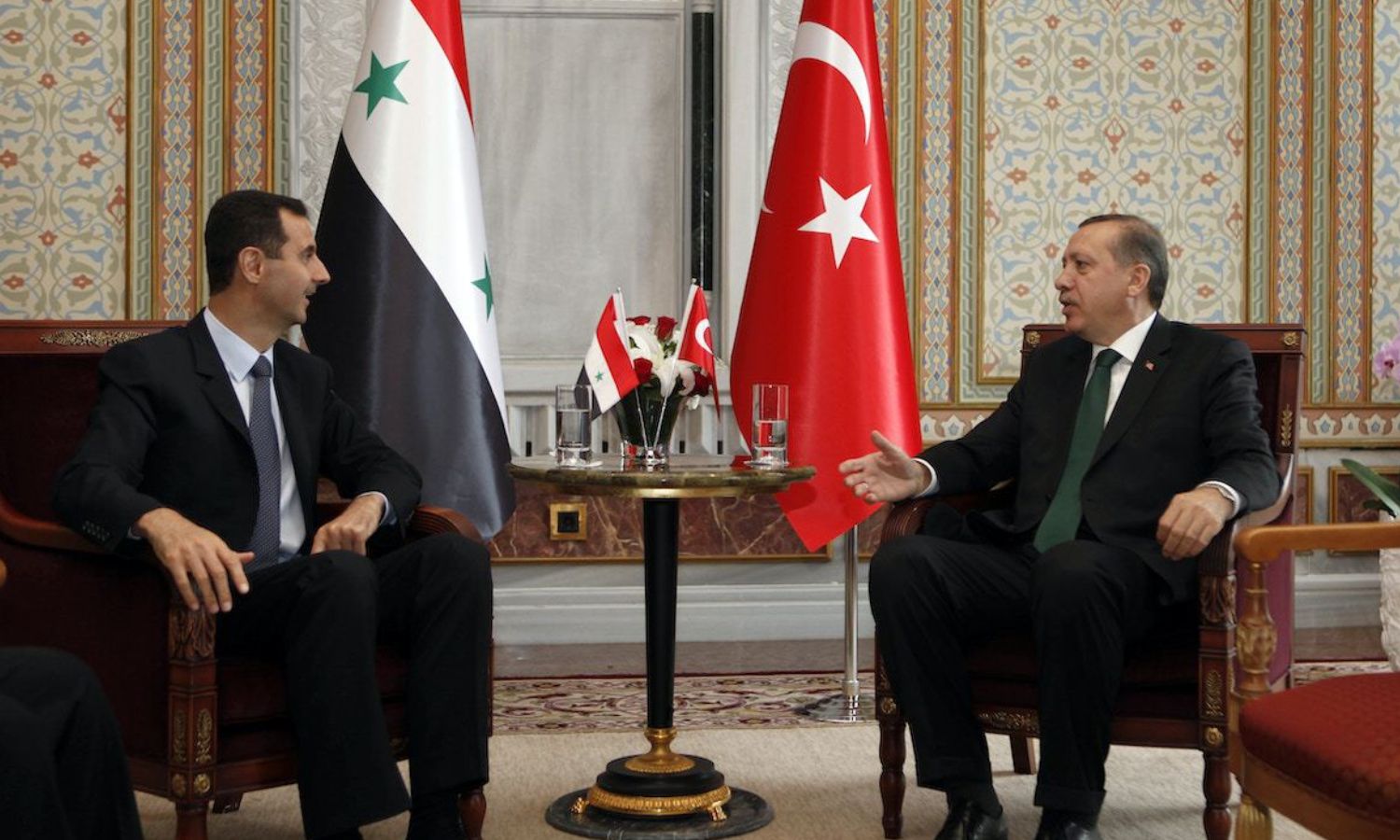
Turkish President Recep Tayyip Erdoğan and Syrian regime head Bashar al-Assad in Istanbul – 2010 (AFP)
if you think the article contain wrong information or you have additional details Send Correction
النسخة العربية من المقال
-
Follow us :













 Syrian regime head Bashar al-Assad and Turkish President Recep Tayyip Erdoğan (Edited by Enab Baladi)
Syrian regime head Bashar al-Assad and Turkish President Recep Tayyip Erdoğan (Edited by Enab Baladi)





 A
A
A
A
A
A








 More In-Depth
More In-Depth